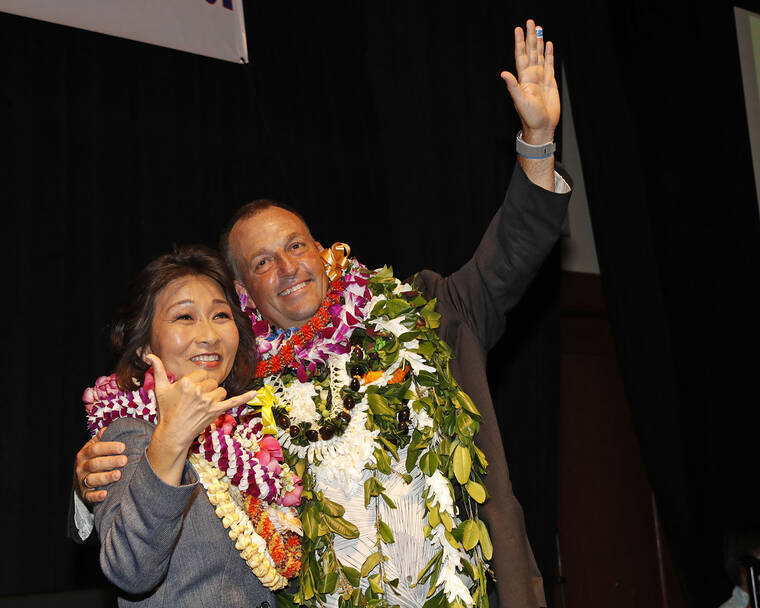HONOLULU — Lt. Gov. Josh Green, a Democrat, on Tuesday defeated Republican former Lt. Gov. Duke Aiona to be Hawaii’s next governor and vowed to tackle the state’s most stubborn problems.
“Tonight is the first day of that new era where our leaders must start doing more to listen, to care and to work on issues that matter to all of us, that matter to you,” Green told a crowd at the Democratic Party’s election celebration.
He said his election was about the dreams and aspirations of Hawaii’s people.
“We will take on the problems that have seemed too difficult to solve or have it impossible to engage,” he said.
Both Green and Aiona focused on Hawaii’s debilitating housing costs as the most important issue of their campaigns and their prospective administrations.
Statewide, the median price for a single-family home topped $900,000 during the coronavirus pandemic. That’s among the highest in the nation, even though many in Hawaii work in low-wage tourism and service industry jobs. On Oahu, the median is over $1 million.
Green said he would encourage the construction of 10,000 new housing units to help address the housing shortage. He aims to crack down on vacation rentals and tax vacant houses to encourage property owners to open up their empty dwellings for residents to rent.
Green has served as second-in-command to Hawaii Gov. David Ige for the past four years. Prior to that, he was a state senator and representative. Green was a doctor in rural areas on the Big Island before entering politics. He has continued working part-time as a physician while in the state Legislature and as lieutenant governor.
Green developed a following during the COVID-19 pandemic for his explanations of infection rates and trends and hospital treatment capacity.
Green was born in Kingston, New York, and grew up in Pittsburgh, Pennsylvania. He moved to Hawaii with the National Health Service Corps in 2000.
Green was heavily favored to beat Aiona, who unsuccessfully ran for the office in 2010 and 2014.
Aiona, who is Native Hawaiian, served as a Family Court judge and Circuit Court judge before he was lieutenant governor. He spearheaded the Hawaii Drug Court program which offers rehabilitation to non-violent offenders as an alternative to prison.
On the campaign trail Aiona proposed developing affordable housing that would be kept affordable in perpetuity. For example, take an affordable property designated for buyers with 80% of area median income. When it’s time to sell, buyers of those units would only be allowed to sell to buyers who are also in the 80% area median income bracket.
He said this would preserve housing for local residents.
Aiona lamented that many Hawaii people can’t afford to live in their homeland.
“I’ve heard too many stories about families where the children can’t come back, the grandchildren can’t come back. And it all ties into housing,” Aiona said at a news conference about his proposals during the campaign.
Green vowed to protect abortion rights after the U.S. Supreme Court earlier this year overturned its 49-year-old precedent guaranteeing a national right to abortion. He used opportunities in debates to highlight Aiona’s longstanding opposition to abortion.
Aiona responded that the Supreme Court’s ruling didn’t change Hawaii’s law which established a state right to abortion in 1970. He said the state Legislature would decide Hawaii’s abortion law, and said the candidates should instead focus on other issues like crime.

